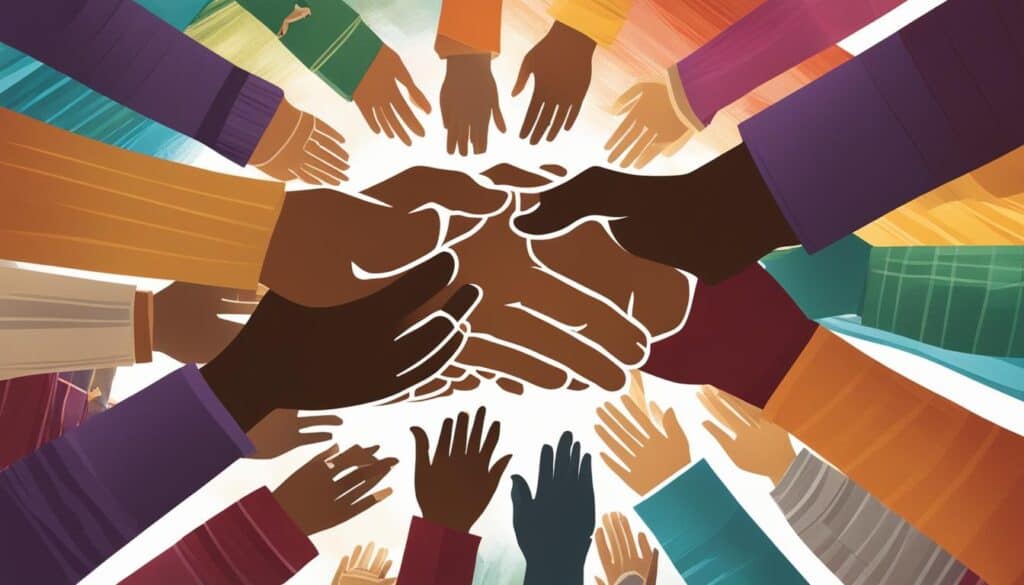Have you ever wondered how acts of community support can strengthen your faith and build strong bonds within your community?
In this article, we will explore the profound benefits of Believer Solidarity and how it can transform individuals and communities. Through prayer and intercession, sharing resources and generosity, bearing one another’s burdens, encouraging and building each other up, serving one another in love, and forgiving and reconciling, believers can experience healing, eliminate need, deepen relationships, strengthen their faith, serve one another, and foster unity and peace within their community.
Are you ready to discover the rewards that come with these acts of Believer Solidarity and witness the power of a supportive community?
The Power of Prayer and Intercession
One of the essential acts of Believer Solidarity is prayer and intercession. By confessing sins and praying for one another, believers can experience healing and witness the powerful efficacy of prayer. When we approach God in prayer, we acknowledge our dependence on Him and invite Him to work in our lives and in the lives of others.
“…The prayer of a righteous person is powerful and effective.”
James 5:16 (NIV)
James 5:16 emphasizes the significance of prayer in the life of a believer. It highlights the power and effectiveness of prayer when offered by someone who walks in righteousness. Our prayers have the ability to bring about miraculous transformations, both in our personal lives and in the lives of those we intercede for. Through prayer, we can experience healing, restoration, and breakthrough.
Prayer is a direct line of communication with God, where we can pour out our hearts, seek His wisdom, and present our requests. It is through prayer that we align ourselves with God’s will and invite His intervention in our circumstances. The act of interceding for others demonstrates our love and care for them, as we lift up their needs, concerns, and desires to the Lord.
When we recognize the powerful efficacy of prayer, it deepens our faith and strengthens our relationship with God. We gain confidence in the knowledge that God hears our prayers and is actively working on our behalf. Prayer becomes a source of hope, comfort, and assurance.
Through Believer Solidarity, we can come together in prayer and intercession, supporting one another in our spiritual journeys. By joining forces, we create a powerful force for good, amplifying the impact of our individual prayers. Together, we can witness firsthand the healing and transformative power of prayer.
Next, we will explore another important act of Believer Solidarity: Sharing Resources and Generosity.
| Benefits of Prayer and Intercession | Scriptural Reference |
|---|---|
| Healing and restoration | James 5:16 |
| Increased faith and trust in God | |
| Cultivation of a deeper relationship with God | |
| Confidence in God’s provision and intervention | |
| Unity and support within the community |
Sharing Resources and Generosity
In the spirit of Believer Solidarity, sharing resources and practicing generosity are vital acts that strengthen community bonds and uplift those in need. By following the example set by early believers in Acts 4:32-35, who selflessly shared everything they had, communities can eliminate poverty and provide for one another’s needs.
“All the believers were one in heart and mind. No one claimed that any of their possessions was their own, but they shared everything they had. With great power, the apostles continued to testify to the resurrection of the Lord Jesus. And God’s grace was so powerfully at work in them all that there were no needy persons among them. For from time to time those who owned land or houses sold them, brought the money from the sales and put it at the apostles’ feet, and it was distributed to anyone who had need.” – Acts 4:32-35
When believers share their resources generously and selflessly, the rewards are profound. By alleviating poverty and meeting the needs of others within the community, a sense of unity and care is fostered, creating an environment where everyone flourishes. The act of sharing resources not only fulfills the commandment of loving one’s neighbor but also demonstrates the love of Christ in action.
Elimination of Need and Poverty
By sharing resources and practicing generosity, communities can eliminate the glaring issues of need and poverty from their midst. When believers come together to provide for one another, they create a safety net that ensures no one is left behind. Sharing resources allows individuals and families to have their most basic needs met, such as food, shelter, clothing, and healthcare.
Furthermore, generosity breaks down barriers and bridges the gap between socio-economic disparities. It creates a culture of empathy, where individuals are willing to support and uplift each other, regardless of their own personal gain. As a result, the entire community thrives, and poverty becomes an issue of the past.
Benefits of Generosity
The act of sharing resources and practicing generosity benefits not only the recipients but also the givers themselves. When you give selflessly, you experience a deep sense of fulfillment and purpose. You realize the impact your actions can have on someone’s life, and that feeling is incomparable.
Moreover, generosity strengthens the fabric of community relationships. It builds trust and deepens the bonds between individuals, fostering a spirit of unity and cooperation. When people come together to support one another, they create a resilient and supportive network that can withstand any challenges or hardships.
Rewards of Sharing Resources and Generosity
| Rewards | Description |
|---|---|
| Elimination of need and poverty | By sharing resources, communities can ensure that no one goes without the essentials, eliminating poverty within their midst. |
| Strengthened community bonds | Generosity fosters unity and cooperation, building strong relationships among community members. |
| Sense of fulfillment and purpose | Giving selflessly brings a profound sense of satisfaction and meaning to the lives of individuals. |
| Creation of a supportive network | Sharing resources and practicing generosity creates a resilient community that can collectively overcome challenges. |
Bearing One Another’s Burdens
Believer Solidarity calls for the act of bearing one another’s burdens, a fundamental aspect of fulfilling the law of Christ (Galatians 6:2). By willingly shouldering each other’s struggles and hardships, believers not only strengthen their relational bonds but also cultivate a compassionate and supportive community that exemplifies the love of Christ.
When you bear one another’s burdens, you demonstrate empathy and selflessness, standing alongside your fellow believers in times of need. This act of solidarity reflects the teachings of Jesus, who Himself carried the burdens of humanity. By following in His footsteps, you actively participate in the fulfillment of Christ’s law.
“Bear one another’s burdens, and so fulfill the law of Christ.” – Galatians 6:2
When you bear the burdens of others, you provide a safe space for transparency, vulnerability, and healing. Through your support, you offer emotional comfort, practical assistance, and a listening ear. This act of solidarity enables individuals to experience the fulfillment and grace of Christ’s law in a personal and tangible way.
- Emotional Support: By actively listening and empathizing with others, you create a nurturing environment where burdens can be shared and emotional healing can take place.
- Practical Assistance: Whether it’s offering a helping hand, providing resources, or lending a listening ear, your acts of support and service can ease the physical and logistical burdens faced by others.
- Encouragement and Prayer: Your uplifting words and fervent prayers can provide strength, comfort, and hope to those carrying heavy burdens.
| Rewards of Bearing One Another’s Burdens | Description |
|---|---|
| Fulfillment of Christ’s Law | By actively participating in bearing one another’s burdens, you align yourself with Christ’s teachings and demonstrate love in action. |
| Deepened Relational Bonds | As you support and carry the burdens of others, you forge deeper connections, fostering a sense of belonging and unity within the community. |
| Individual Growth and Transformation | By recognizing and responding to the needs of others, you cultivate humility, compassion, and resilience within yourself, leading to personal growth and spiritual maturity. |
| A Culture of Support and Love | The act of bearing one another’s burdens creates a culture of support, where individuals experience the tangible love of Christ through the selfless actions of fellow believers. |
In conclusion, bearing one another’s burdens is a vital aspect of Believer Solidarity, offering a tangible expression of love and support within the community. By actively engaging in this act of solidarity, you not only fulfill the law of Christ but also foster a culture of empathy, unity, and personal growth.

Encouraging and Building Each Other Up
Believers are called to encourage and build each other up in the journey of faith. As stated in 1 Thessalonians 5:11, you have the power to uplift and support your fellow believers. By offering words of affirmation, motivation, and support, you can be a source of strength for others in their spiritual walk.
Encouraging one another goes beyond simple compliments or pleasantries. It involves recognizing the unique gifts and talents that God has bestowed upon each individual and expressing genuine appreciation for them. By acknowledging and affirming these qualities, you help others recognize their value and purpose in the body of Christ.
When you build each other up, you contribute to a nurturing environment for spiritual growth. Your words and actions can serve as a catalyst for strengthened faith and increased resilience against spiritual and emotional challenges. By investing in the lives of others, you create a community that supports, uplifts, and spurs one another on to love and good deeds.
Building Each Other Up: Practical Ways to Encourage Fellow Believers
- Speak words of encouragement and affirmation.
- Pray for and with others, interceding for their needs and desires.
- Offer a helping hand in times of difficulty or hardship.
- Provide a listening ear and offer wise counsel when needed.
- Express gratitude for the unique gifts and contributions of others.
- Share inspiring testimonies and stories of God’s faithfulness.
“Let us think of ways to motivate one another to acts of love and good works.” – Hebrews 10:24
Remember, as you encourage and build up others, not only do you contribute to their growth and well-being, but you also
strengthen your own faith
. Through acts of solidarity like these, you create a supportive network within the community, fostering resilience, and fostering a sense of unity and purpose.
So, let us embrace the call to encourage and build each other up, knowing that by doing so, we not only strengthen our faith but also create a community that stands firm in the face of challenges, resilient in times of difficulty, and united in love.
Serving One Another in Love
In the journey of Believer Solidarity, one significant act that encompasses the essence of unity and selflessness is serving one another in love. This act of humility and compassion, rooted in the teachings of Galatians 5:13, carries the reward of fostering a culture that values humility and selflessness.
By actively serving one another, believers exemplify the heart of Christ and create a community that reflects His servanthood. This humble act goes beyond simple tasks and gestures; it is an expression of love that uplifts and blesses both the recipient and the giver. Through acts of service, believers tangibly demonstrate their commitment to one another and to God.
The rewards of serving one another in love extend far beyond the immediate benefit of the act itself. When individuals prioritize the well-being and needs of others, it creates a culture that promotes humility and selflessness. In such a community, the focus shifts from self-centeredness to collective support, fostering an environment where every person feels valued, cherished, and supported.
Serving one another in love also brings immeasurable joy and fulfillment. As you extend a helping hand, lend a listening ear, or perform acts of kindness, you experience the beauty of selfless service and witness the transformative power it holds. There is a profound sense of purpose that comes from being an instrument of God’s love and an agent of positive change in the lives of those you serve.
Through this act of solidarity, not only do individuals experience personal growth and spiritual maturity, but the community as a whole thrives. When believers collectively serve one another in love, barriers are broken down, and relationships are strengthened. The bonds within the community become rooted in a shared commitment to compassion, empathy, and support.
Believer Solidarity through serving one another in love is a transformative practice that shapes individuals and communities. It establishes a foundation of humility and selflessness that creates a nurturing and empowering environment for everyone involved. By prioritizing the needs of others and selflessly serving, believers cultivate a culture that reflects the heart of Christ and testifies to the power of unity.

Next, we will explore another essential act of Believer Solidarity – forgiving and reconciling. Through the power of forgiveness, believers experience healing, maintain unity, and foster a community rooted in peace and reconciliation.
Forgiving and Reconciling
In the journey of Believer Solidarity, an integral part is the act of forgiving and reconciling, as emphasized in Colossians 3:13. By extending forgiveness and seeking reconciliation, you can foster the healing of relationships, ensure the maintenance of unity, and cultivate a profound sense of peace within your community.
Forgiveness holds the power to mend broken bonds and restore trust. It allows for the release of resentment, bitterness, and anger, paving the way for healing and reconciliation. When you choose to forgive, you acknowledge the humanity in one another, recognizing that everyone falls short and is in need of grace. By offering forgiveness, you are not only empowering the healing of relationships but also demonstrating the core values of love and compassion.
Reconciliation, on the other hand, takes forgiveness a step further. It involves actively seeking restoration and harmony in relationships. It requires open communication, vulnerability, and a willingness to bridge divides. Through reconciliation, you are able to rebuild trust, mend the broken pieces, and forge a path towards unity and peace.
Embracing the transformative power of forgiveness and reconciliation not only benefits individual relationships but also strengthens the fabric of your entire community. When you practice forgiveness and reconciliation, you create an environment that encourages others to follow suit. This culture of forgiveness fosters healing, unity, and respect, allowing your community to thrive and fulfill its purpose.
